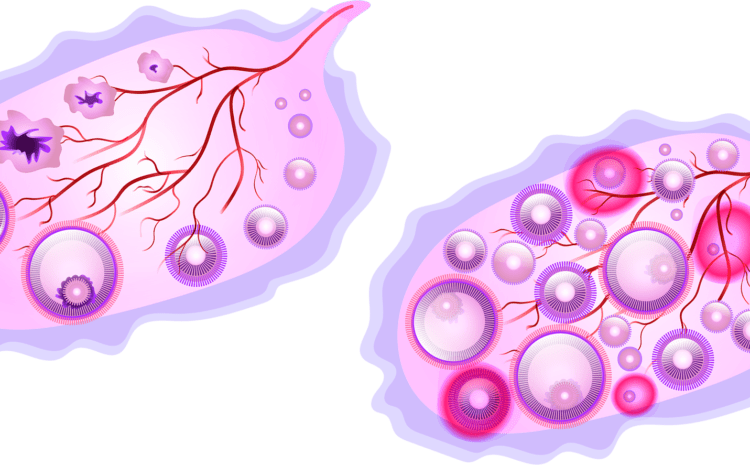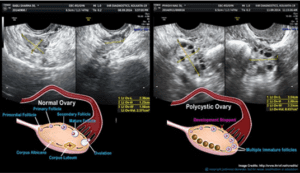Do not fear PCOS

PCOS - Do Not Fear
15 year old Ritika (name changed) was standing in front of the mirror. She had always been chubby but having put on 14 kg weight in the last 15 months of the lockdown, she now weighed 56 kg. She looked critically at herself. Horrors! So much hair on her upper lip? And she knew that her periods had been very irregular in the last 8 months. Was something wrong with her body? Would she ever be attractive again? She decided to confide her fears in her mother who took her to a gynaecologist who, after an ultrasound scan, told her that she had Polycystic Ovarian Syndrome (PCOS). She was bewildered! What was that? She had never heard of it.
What is Polycystic Ovary Syndrome PCOS?
PCOS is a hormonal disorder that interferes with normal reproductive processes. It is getting increasingly common of late among young women. It can start at puberty and is associated with irregular menstrual cycles and other hormone-related symptoms. What stresses the patients the most is the bad physical appearance such as the bloated body, acne, excess hair on face and body (hirsutism) and alopecia (loss of hair on the scalp). Doctors are concerned however with the more important health issues associated with PCOS such as infertility, the risk of developing diabetes and even heart disease. Risk factors for developing PCOS include childhood obesity and a family history of PCOS and/or diabetes.
PCOS is a condition of imbalance of hormones including the female sex hormones, excess of the male sex hormones (androgens) and insulin that regulates blood sugar. The effects are seen on menstrual periods, fertility and physical appearance (e.g. acne & excess body hair). But the hallmark of the disease is the presence of multiple cysts in the ovaries, which is referred to as polycystic ovaries which gives the disease its name. It also causes insulin resistance (condition in which the body does not respond to the effects of insulin) and that can result in diabetes mellitus.

What happens during PCOS and what exactly causes irregular periods?
Testosterone is the male sex hormone that is produced in very small amounts by the ovaries in all women. Women with PCOS have increased production of testosterone and this is associated with many of the symptoms of the condition. The higher-than-normal levels of androgens produced prevent the ovaries from releasing an egg each month. The eggs remain within the ovaries and appear as cysts. Result? Irregular menstrual periods and even inability to conceive.
Some causes of PCOS:
- Increased hormones i.e. insulin and androgens.
- Family genes.
- Obesity worsens the symptoms.
How do I know if I have PCOS?
PCOS can be diagnosed via an ultrasound scan. Following are signs that you may be diagnosed with PCOS:
- Irregular periods or no periods.
- Excess facial hair or body hair, acne.
- Ultrasound showing too many cysts in your ovaries.

What can I do about my condition?
First of all, do not panic. PCOS is curable and manageable, and those with PCOS can lead completely normal lives.
By now, it is obvious to you that it involves many systems of the body i.e. the reproductive system, the hormonal system, the skin and so on. Therefore, it needs a group of specialist doctors working in conjunction to tackle it completely.
When PCOS is suspected, a complete medical history, physical examination, blood tests, and a pelvic ultrasound should be performed. Blood is drawn to assess hormone levels, glucose and lipid levels, and a pelvic ultrasound is performed to scan for ovarian cysts. During the assessment period, other potential causes associated with reproductive, endocrine and metabolic dysfunction need to be excluded.
The treatment is prolonged for several months before things come under control. Excess body weight (one of the causes of PCOS) needs to be reduced by a combination of exercise therapy and calorie-restricted diet. In fact, lifestyle modifications are considered as a cost-effective first line treatment and as a necessary adjunct to medication. This requires the guidance of a nutritionist, and even a psychological counsellor to guide the patient into achieving this. A dermatologist is required to address the problems in the skin such as the facial acne and excessive hair. There are several drugs that can help to achieve this as well as cosmetic procedures that can be carried out by the dermatologist. On the medical part, treatment goals include regularising of periods, correcting anovulation, restoring fertility and reducing insulin resistance to delay the onset of diabetes. Treatment with hormones (like the contraceptive pill) will ensure regular periods. Women who wish to become pregnant can sometimes be given medications to help them ovulate and conceive.

By Dr. Neha Dighe Bhise
Dr. Neha Dighe Bhise is Consultant Endocrinologist at GSBS Medical Trust, Mumbai
At Health Rakshak, we have introduced a PCOS clinic where we strive to provide a holistic approach to overcome the condition and lead a healthier life. This approach includes:
- A team of consulting doctors
- Nutritional advice
- Addressing mental health problems
- Extracurricular activities
